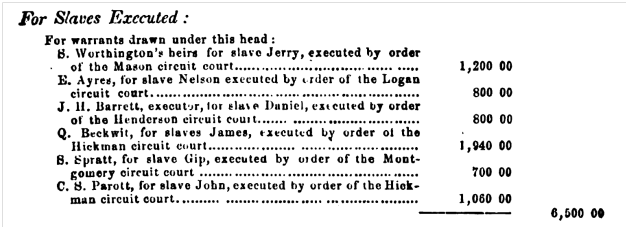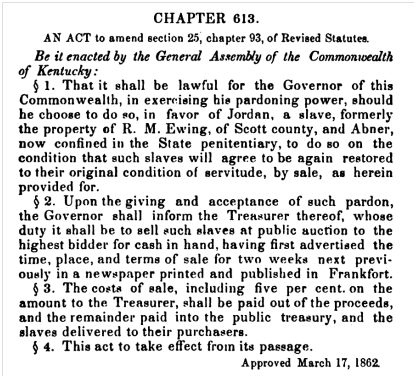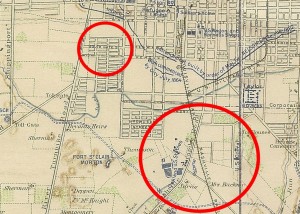By Tony Curtis
On April 8, 1863, the Hickman Circuit Court empanelled a grand jury to review an arson case against three enslaved, runaway men—John, Elijah, and James. The jury indicted the three men for, “maliciously willfully and feloniously, set fire to and burn the dwelling house of Wm Poore, the Said Slaves having conspired to-gether. . .with one [gap] Wheeler (a white man).” All pled not guilty to the charges with court appointed attorneys by their side, but the jury found all three “guilty as charged and Say by reason thereof they shall Suffer death, but we recommend that the Governor modify the Same to punishment in the penitentiary for life.”
Not all Hickman County citizens agreed. In a letter to Governor James F. Robinson, twenty-five citizens of the county maintained that “the crime of these negroes was committed with every circumstance of atrocity possible, and simple justice demands their execution under the law.” The petitioners claimed that the three defendants had been seen with the 21st Regiment of Missouri Volunteers while at Clinton (whose commanding officer appeared on their behalf at the trial) and that they are “a scourge and terror to the whole County. They obtain arms—United States muskets—whenever they choose and make nightly excursions into the country, bursting open the houses of citizens, robbing them, putting upon them and their wives & families every kind of indignity and insult short of actual murder and violation.”
Voicing the frustration of Kentucky slave owners in the wake of the Emancipation Proclamation, they stated that the military had taken no action to stop the alleged robberies and that the “citizens of this county have no hope except in the civil laws. If these afford them no protection and that immediately society here will be broken up and the negro become supreme.” They wanted a “stern but just” sentence to intimidate their “fellow marauders,” where “imprisonment would strike little terror to the negro.” Governor Robinson agreed, and the Court ordered all three men to be hanged on May 15, 1863.
As interesting as the politics of the case, historians should also pay attention to the procedures demanded by law when slaves were to be executed. The Revised Statutes of Kentucky (1852) specified that slaveowners be compensated for the execution of their slaves convicted of crimes. From Chapter 93, Article 7, Section 24:
§ 24. When the court shall sentence to death a slave, the value of such slave shall be fixed by the court, and entered on record. If the slave be executed, or die in jail, after conviction, before the day of execution, the value, so fixed, shall be paid out of the public treasury to the master or owner, upon a presentation of a copy of the record, and certificate of the sheriff of the fact of the death or execution of such slave. If a slave, imported into this state contrary to law, or passing through this state, by land or water, to any other state, territory, or country, be executed for crime, or die before execution, he shall not be paid for as above.
To obtain a value on each of the slaves, the Hickman Circuit Court reached out to individuals “acquainted with the Value of Slaves”—in this case two physicians (H. O. Earle & C. T. Seay) and a farmer (George B. Moss). Seay and Moss owned slaves, though the record is unclear as to whether Earle owned any slaves. However, it is interesting to note that they consulted two physicians and a farmer—assessing value in terms of both physical ability and skill sets. Was this a standard makeup of court appointed valuators of slaves? Was there a particular set of qualifications to fulfill this requirement? Was there a standard form used to evaluate each enslaved person? Whatever the answers are to these questions, they valued each man as follows, “John (the slave of C S Parrott) at One thousand & Sixty Dollars. James (the Slave of Quirus Beckwith) at One thousand one hundred & forty Dollars and Elijah (the slave of Quirus Beckwith) at Eight hundred dollars.”
The Annual Report of the Auditor of Public Accounts…for fiscal year ending October 10, 1863, confirms the payment of the aforementioned amounts to Beckwith and Parrott:

As the Caroline Chronicles reminds us, money flowed out of the state coffers and in some cases into the state coffers as a direct result of slaves being caught up in the Kentucky legal system. In this case, public funds were used to compensate slaveowners for their loss of human property.
Another twist on the state’s criminal laws and slavery documented in CWG-K collections occurred in 1862, when two enslaved men—Jordan of Scott County, Kentucky, and Abner of Graves County, Kentucky—were convicted of Manslaughter and sentenced to life in the Kentucky State Penitentiary. In these cases legislative action was sought to remove these men from the penitentiary and sell them back into slavery. The men agreed to this pardon and to the stipulation to be returned to slavery—with no say as to who and where they would be sold at public auction. Chapter 93, Article 7, Section 25 of the Kentucky Revised Statutes needed amended in order to give the Governor the power to sell Abner and Jordan back into slavery. This section already granted the governor the power to commute the sentence of a slave, but it did not give him the power to sell said enslaved men into slavery to the financial benefit of the state. The act only stipulated that the slaveowner “shall be paid for him as though he were executed, or take the proceeds of his labor in the penitentiary.” An act passed on March 17, 1862, entitled “An ACT to amend section 25, chapter 93, if Revised Statutes”, amended this section:

An advertisement for the sale was placed in the Frankfort newspapers , and Jordan and Abner were returned “to their original condition of servitude” by the governor and the state treasurer by public auction held at the Franklin County Courthouse doors on July 21, 1862. The proceeds were “paid into the public treasury, and the slaves delivered to their purchasers.”
These two documents offer insight into another way in which Kentucky was complicit in the perpetuation of the institution of slavery—by codifying and enforcing slave laws, collecting taxes on enslaved property, just to name a few ways—and in the instance of these two documents, by compensating slaveowners when the enslaved were executed and by collecting payment for enslaved persons sold at public auction from the Kentucky State Penitentiary. This is yet another example of how the entire white population of Kentucky—slaveowner or non-slaveowner, rich and poor—participated in and benefited from the fully integrated slave economy.
Tony Curtis is an Assistant Editor with the Civil War Governors of Kentucky Digital Documentary Edition.
SOURCES: Commonwealth of Kentucky vs. John a Slave of C. S. Parrott Elijah & James Slaves of Q Beckwith, Indictment, April 11, 1863, Kentucky Department for Libraries and Archives (hereafter KDLA); Thomas G. Poore et al. to James F. Robinson, Correspondence, April 11, 1863, KDLA; For more on the policy of the military and runaway slaves, see Diane Mutti Burke On Slavery’s Border: Missouri’s Small-Slaveholding Households, 1815-1865 (2010), 284-287; Revised Statutes of Kentucky, 627-648; 1860 Federal Slave Schedule, Ancestry.com; Annual Report of the Auditor of Public Accounts…for fiscal year ending October 10, 1863, 18; Tri-Weekly Commonwealth (Frankfort, Ky.), July 4, 1862; Acts of the General Assembly of the Commonwealth of Kentucky, 243; See also Tim Talbott, “Negroes for Sale,” Random Thoughts on History (blog), June 19, 2013, http://randomthoughtsonhistory.blogspot.com/2013/06/negroes-for-sale.html; and Abner and Jordan, Affidavit, July 21, 1862, KDLA.




 “All of which your petitioner would respectfully submit and implore the exercise in his behalf of your Excellency’s clemency
“All of which your petitioner would respectfully submit and implore the exercise in his behalf of your Excellency’s clemency